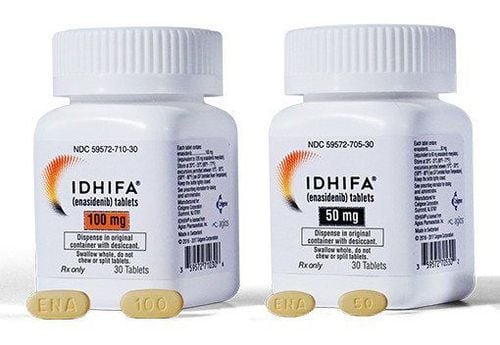This is an automatically translated article.
Estramustine is a class of cytotoxic chemotherapy drugs used in the treatment of certain forms of prostate cancer. The drug works on the principle of increasing estrogen interferes with prostate cancer and slows and stops the growth of cancer cells.
1. What is Estramustine?
Estramustine is a combination of the chemotherapy nitrogen and an estrogen called estradiol. Estramustine works by disrupting the intracellular network of microtubules necessary for cell division and other normal cellular functions. The estradiol in Estramustine also reduces the body's production of testosterone. Most prostate cancers require a supply of the male hormone testosterone to grow. Without testosterone, cancer cells may grow more slowly or stop growing altogether. Both of these effects work to stop the growth and spread of cancer cells.
2. What is Estramustine for?
Estramustine is indicated in the treatment of certain forms of prostate cancer. In the body, Estramustine breaks down into estrogens (estrone, estradiol) and a cancer drug (estromustine). This medication works by increasing the estrogen that interferes with prostate cancer and by slowing and stopping the growth of cancer cells.
3. How to take Estramustine
Estramustine is available in capsule form and the dosage is determined based on the patient's body size. Because it is a capsule, it is best to take the tablet whole with water, do not open, break or chew.
The drug is taken as 3 or 4 doses a day on an empty stomach (1 hour before or 2 hours after a meal).
Starting dose: Usually 14 mg/kg per day, divided equally into 3 or 4 doses.
Treatment with this drug usually lasts for 30 – 90 days before the doctor determines the effectiveness to continue treatment. Treatment should continue as long as a favorable response persists. Some patients have maintained treatment for more than 3 years with doses of 10-16 mg/kg/day.
The most important thing is to make sure to take the right amount of medicine each time, so be careful before taking it.
Also, do not increase the dose on your own or take it more often than prescribed, as this can increase the risk of serious side effects.
4. Storage and handling of Estramustine
Store the medicine in the original container Store at room temperature, away from moisture and light. Do not store in the bathroom or in the freezer. Keep container out of reach of children and pets. Note to patient caregivers:
Patient caregivers should consider wearing gloves or pouring medication directly from their container into a lid, small cup, or directly into the patient's hand to avoid touching the tablet. Women who are pregnant or breastfeeding should not prepare doses as this medicine can be absorbed through the skin and lungs Always wash your hands before and after taking Estramustine Do not flush the toilet or throw it in the trash
5. Estramustine side effects
Here are some common side effects when using Estramustine:
Breast engorgement or breast tissue increase An increase in breast tissue (gynecomastia) or breast engorgement may develop. Your doctor may prescribe pain medication or, in rare cases, radiation may be given to ease severe pain.
Fluid retention or swelling Some patients may experience fluid retention, which can cause swelling of the feet, ankles, face or weight gain. Fluid can also build up in the lungs and make it difficult for the patient to breathe. Tell your doctor if you experience swelling, unexpected weight gain, or trouble breathing.
High blood pressure This medicine may cause high blood pressure (hypertension). Patients should have their blood pressure checked regularly during treatment. Any hypertension should be treated appropriately. If the hypertension is not controlled, the drug can be discontinued. Report any headaches, vision changes, or dizziness to your cancer care team.
Blood clots and heart attacks Estramustine may increase your risk of blood clots and heart attacks. If you experience any of the symptoms listed below, contact your doctor immediately or go to the emergency room: swelling, redness, or pain in your extremities, pain or tightness in your chest, pain in your arms, back, neck, or jaw, or difficulty breathe.
High blood sugar Estramustine may increase blood sugar in patients with and without diabetes. Your doctor will monitor your blood sugar. If you have symptoms such as increased thirst, urination or hunger, blurred vision, headache or fruity breath, tell your doctor. Diabetics should closely monitor their blood sugar and report increases for prompt evaluation by their physician/nurse.
Fertility Estramustine may affect fertility, resulting in sperm production in men becoming irregular or permanently stopping. In addition, male patients taking Estramustine may experience erectile dysfunction or decreased sex drive during treatment. Talk to your urologist for treatment options for erectile dysfunction.
Exposure of an infant to Estramustine can cause birth defects, so it is not recommended to have children while taking this medicine. Effective birth control is required during treatment, and contraception should be used during sexual intercourse.
6. Estramustine can interact with any food or drink?
Food, alcohol and tobacco can interact with certain drugs. Consult your doctor about taking your medicine with food, alcohol and tobacco.
Care should be taken when taking Estramustine with dairy foods.
Estramustine should not be taken with supplements that are high in calcium or magnesium (including antacids), as they may interfere with its absorption.
Please dial HOTLINE for more information or register for an appointment HERE. Download MyVinmec app to make appointments faster and to manage your bookings easily.













